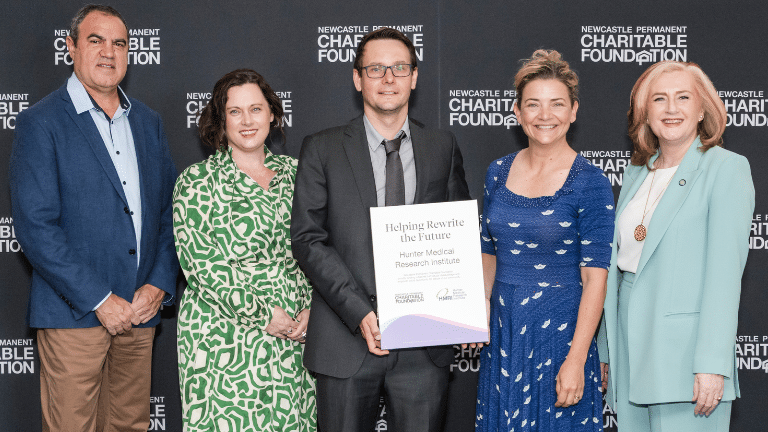
HMRI researchers have received a $98,700 grant from the Newcastle Permanent Charitable Foundation for the development of new treatment for two inflammatory bowel diseases (IBD): Crohn’s disease and ulcerative colitis.

Dr Gerard Kaiko and his team, from HMRI’s Immune Health Research Program, will undertake world-first research developing a new therapy to reduce the long-term disease progression of Crohn’s disease, IBD and ulcerative colitis.
Australia has among the highest rates of IBD in the world with over 100,000 Australians living with the effects of IBD. There is currently no cure.
Children with IBD are unable to eat or drink normally, need to go to the toilet urgently without warning, and often become underweight, dehydrated and malnourished. It can all take a toll on their long-term health and wellbeing.
While there are therapies that target IBD, these therapies only target inflammation. But IBD is a lifelong disease and these therapies do not stop its progression. This means many people living with IBD tend to require major intestinal surgery, frequent hopsitalisation and obtain life-long medical issues.
The therapy is designed to improve intestinal barrier function, prevent intestinal damage, and improve healing by blocking intestinal molecules called microbial proteases.
This grant was part of the Newcastle Permanent Charitable Foundation’s $770,000 funding that supports the delivery of projects and initiatives aimed at improving the health and social wellbeing of vulnerable people in regional New South Wales.
Importantly, this grant will support research right here at HMRI. Using HMRI laboratories and established patient biobank facilities, Dr Gerard Kaiko will lead this project with his research and clinical team as well as other collaborating members of the National Centre of Excellence in Digestive Health based at HMRI led by Laureate Professor Nicholas Talley.
This incredibly generous funding from the Charitable Foundation will allow the Hunter Medical Research Institute to undertake world-first research developing a treatment for IBD/Crohn’s disease progression.
Our goal is to prevent the thousands of children in the Hunter and over 100,000 people across the nation who suffer from these diseases, from having to undertake serious surgery, endure frequent hospital stays and take medications for the rest of their lives.
We want to improve the health and wellbeing of people living with IBD so they have the opportunity for a happy, healthy life.
HMRI would like to acknowledge the Traditional Custodians of the land on which we work and live, the Awabakal and Worimi peoples, and pay our respects to Elders past and present. We recognise and respect their cultural heritage and beliefs and their continued connection to their land.

Hunter Medical Research Institute
We’re taking healthy further.
Locked Bag 1000
New Lambton
NSW, Australia, 2305



This site is protected by reCAPTCHA and the Google Privacy Policy and Terms of Service apply.
Copyright © 2024 Hunter Medical Research Institute | ABN: 27 081 436 919
Site by Marlin Communications
